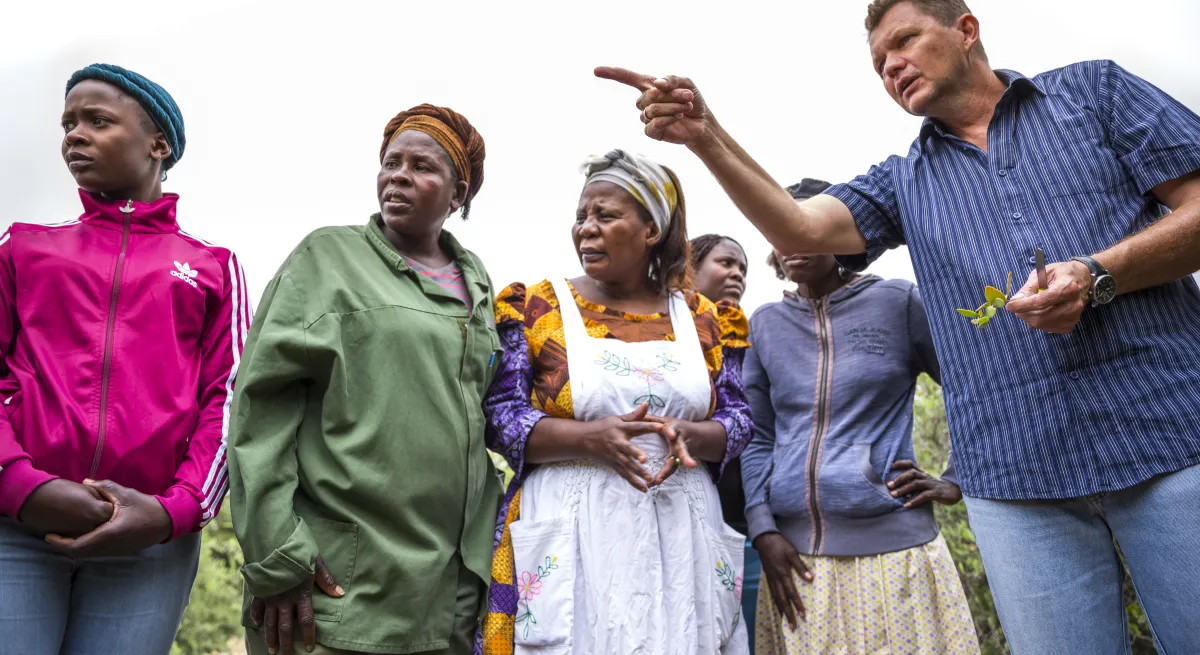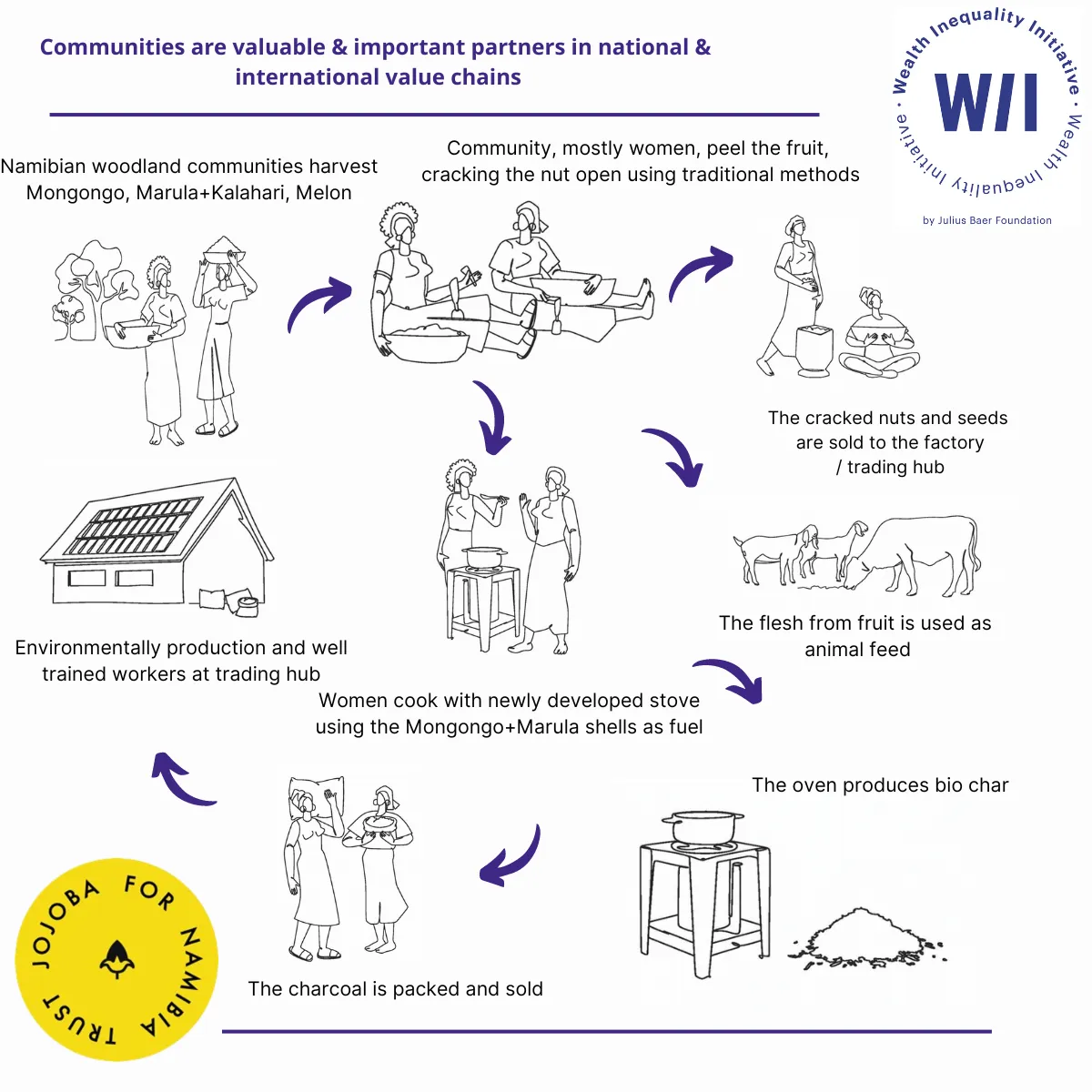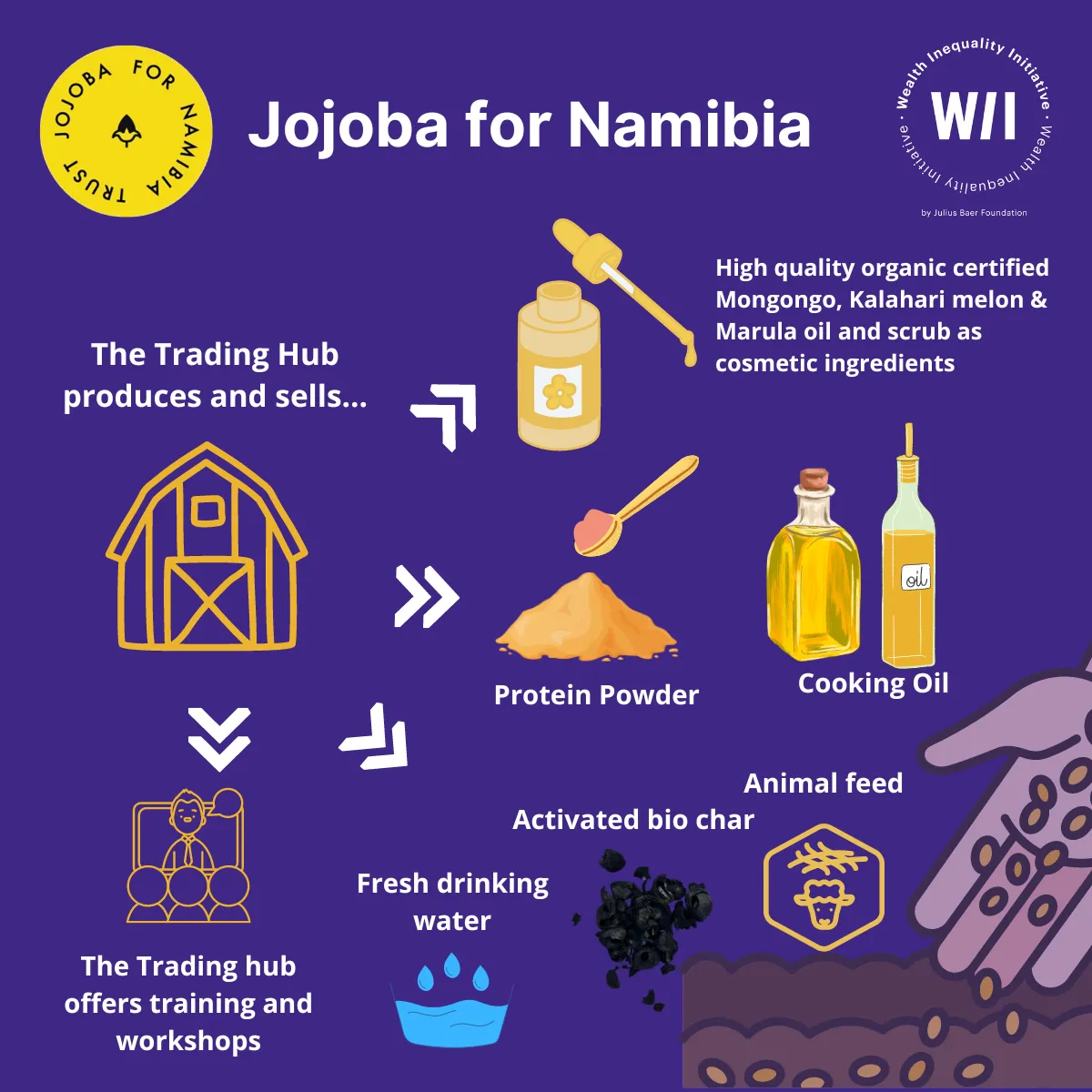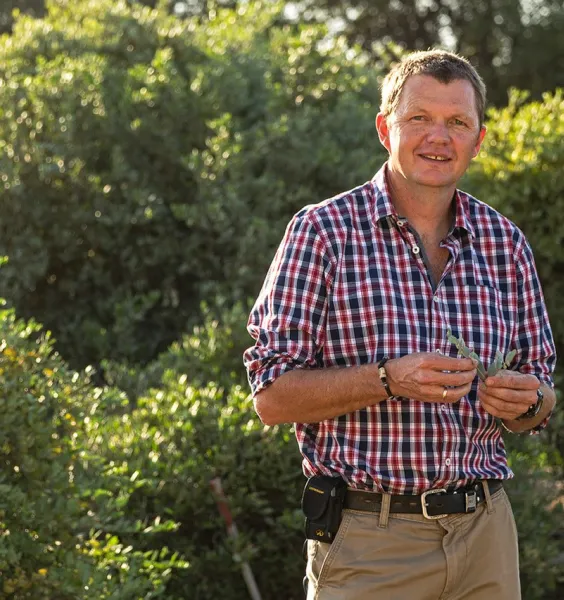Why is the Circular Economy gaining importance in the arid Namibian desert? In this interview Oliver Rust , founder of #Jojoba for Namibia Trust (JfNT), explains why this term is so important for sustainable development in Namibia.
In 2017, Oliver founded the Jojoba for Namibia Trust as a non-profit organisation. The purpose? To support women and men in dry desert areas to build up their own Jojoba plantations and harvesting centres and become a part of the whole value chain. Through its workshops and knowledge transfer, the new farmers gain the skills required to succeed.
What is the Circular Economy? Why is this term gaining importance in the arid Namibian desert?
Let’s start with the first question. The circular economy is a powerful economic model that aims to minimise waste and optimise the use of resources. A circular economy aims to close the loop by keeping resources in use for as long as possible, extracting the maximum value from them, and then recovering and regenerating products and materials at the end of their service life. This model has proven to be highly effective in reducing waste and creating a more sustainable future.
Why is the Circular Economy gaining importance in the arid Namibian desert? In this interview Oliver Rust , founder of #Jojoba for Namibia Trust (JfNT), explains why this term is so important for sustainable development in Namibia.
In 2017, Oliver founded the Jojoba for Namibia Trust as a non-profit organisation. The purpose? To support women and men in dry desert areas to build up their own Jojoba plantations and harvesting centres and become a part of the whole value chain. Through its workshops and knowledge transfer, the new farmers gain the skills required to succeed.

Over the last five years you have worked with communities in Namibia to build a plant oil based economy while respecting their traditions, what has been your biggest learning while doing so?
One of the things we have realised is that our initiatives go far beyond the mere implementation of infrastructure or contractual agreements with communities. It is a multi-approach journey that delves deep into the realities of the communities we engage with.
Beyond the business approach, we encounter a stark reality: children who don’t go to school, communities struggling with hunger and lack of access to clean water. Take, for example, the Okavango community. While appearances may suggest a happy life, beneath the surface lies a pressing problem: a disease that originates from contaminated water sources.
We conduct workshops aimed at empowering locals, ensuring that even the youngest members are included. Education emerges as a key aspect. Many community members lack even basic bookkeeping skills. Therefore, our involvement extends to providing tailored training sessions.
Also, we've learned the importance of managing expectations. Rather than imposing our expectations, we've embraced the need to listen to the community's needs.
We know that the concept of the circular economy has become more and more important in your work. Why is that?
The idea of the circular economy has become central to our work. We focus on the multifaceted needs of the communities we work with. Initially, we produced oil from community-grown seeds for the international cosmetic industry, and we are still doing so. However, we discovered pressing issues such as seasonal hunger and decided to reintroduce traditional livelihoods and indigenous food sources. We expanded our operations to include protein powder and cooking oil production, empowering communities and restoring dignity and pride. Our initiatives extend beyond economic revitalisation, engaging younger generations in cultural heritage and environmental stewardship. We currently serve 2,000 harvesters and produce 1,000 kg of protein and cooking oil per month, with plans to extend our reach.
Our commitment to sustainability includes innovative solutions such as using fruit shells as oven fuel and generating biochar, enriching the nutrient-poor Kalahari sands and improving crop yields. Our journey embodies the circular economy, nurturing, regenerating, and reinvesting resources within the community for a sustainable cycle of prosperity and management.

Building these types of economies requires much more than the materials, or even the infrastructure. Can you give us an idea of all the activities that flow into your work?
We believe that it is about forming true partnerships and addressing the diverse challenges faced by the communities we serve.
This is an ongoing process that requires a commitment to working with these communities on an equal level. Our approach starts with understanding the specific challenges faced by each community. We then train and empower them with the knowledge and skills they need to engage effectively with external entities. Our workshops cover everything from carbon credits to accounting structures and navigating complex regulations such as ABS (Access, Benefit and Sharing). We focus not only on technical knowledge, but also on the practical skills essential for sustainable development. We help communities understand the complexities of food production, as well as budgeting and accounting. Our aim is to empower communities to take control of their economic future. We have learnt that community participation is key to our success. We have moved from being pure facilitators to true partners, recognising that meaningful collaboration can only happen when all stakeholders are empowered through education. In short, education is at the centre of our approach. It is a catalyst for empowerment that enables communities to become equal partners on the path to sustainable development.
Our work focuses on wealth inequality while yours centres on the people you work with. Why are the environmental aspects of the circular economy also so important to you?
The environment is an important focus of our work, as it directly affects the wellbeing of the communities. Without a healthy environment, our livelihoods are at risk. Whether protecting the waters of the Okavango River or conserving the biodiversity of Namibia's forests, our actions today shape the legacy we leave for future generations.
Recognising this fundamental value, we have adopted an approach in which environmental protection is not only a moral obligation, but also a way to economic empowerment. By using the resources of our environment responsibly, we have created sustainable livelihood opportunities.
Our approach represents a fusion of tradition, environmental conservation and strong business principles. It is a socio-ecological business model that ensures the preservation of livelihoods for generations to come. The environmental aspect is therefore not an add-on to our work, but the very foundation on which our values rest: a commitment to protecting our natural wealth for the prosperity of all.
How has adopting the circular economy philosophy changed the socio-economic conditions of the communities you work with?
At the core of this transformation is the restoration of dignity and the safeguarding of traditions. By respecting and embracing traditional livelihoods, we've fostered an exchange of knowledge and respect between elders and youth.
In addition, our initiatives have brought tangible socio-economic benefits. We have created employment opportunities, training hundreds of thousands of women to participate in enterprises selling jojoba oil and other products. And through the production and distribution of protein powder, cooking oil and clean water, we have ensured that essential resources are available to everyone, and all thanks to reusing resources.
Education is the cornerstone of our approach. By imparting valuable skills and knowledge, particularly to the younger generation, we have equipped community members with the necessary tools to improve their livelihoods and maximise the profitability of their enterprises.
What’s more, our interventions have provided viable alternatives to traditional subsistence farming practices. By reducing the impact of recurrent droughts and food insecurity, we have introduced sustainable ways to prosperity, building resilience in these communities.
The wealth gap in Namibia and between rich and poor countries keeps growing and you can't just keep pointing fingers forever. Instead, you can take a stance and start working with the opportunities in your vicinity.
How has adopting the circular economy philosophy changed the socio-economic conditions of the communities you work with?
At the core of this transformation is the restoration of dignity and the safeguarding of traditions. By respecting and embracing traditional livelihoods, we've fostered an exchange of knowledge and respect between elders and youth.
In addition, our initiatives have brought tangible socio-economic benefits. We have created employment opportunities, training hundreds of thousands of women to participate in enterprises selling jojoba oil and other products. And through the production and distribution of protein powder, cooking oil and clean water, we have ensured that essential resources are available to everyone, and all thanks to reusing resources.
Education is the cornerstone of our approach. By imparting valuable skills and knowledge, particularly to the younger generation, we have equipped community members with the necessary tools to improve their livelihoods and maximise the profitability of their enterprises.
What’s more, our interventions have provided viable alternatives to traditional subsistence farming practices. By reducing the impact of recurrent droughts and food insecurity, we have introduced sustainable ways to prosperity, building resilience in these communities.


Oliver Rust was born in Namibia and grew up on a cattle farm. He finished his school with a Matrik certificate in 1992. Between 1992 and 1995 he completed an apprenticeship in Germany as a chef, followed by 2 years working in Switzerland in the hospitality industry.
In 1997 Oliver returned to Namibia, where he established a lodge.
In 2011 he and his family moved to a farm in the Namib desert, establishing a small lodge there.
Oliver founded the first plant oil production company in 2017, establishing the Jojoba for Namibia Trust later in the same year.
In 2018, together with other partners, he founded Namib Desert Oils UG, a company in Germany which aims to create a market for the plant oil produced in Namibia.
Oliver is married to Verena and they have two daughters.
About Jojoba for Namibia

Make an impact that lasts a lifetime — discover opportunities at Jojoba for Namibia to donate, volunteer, work, and learn.
